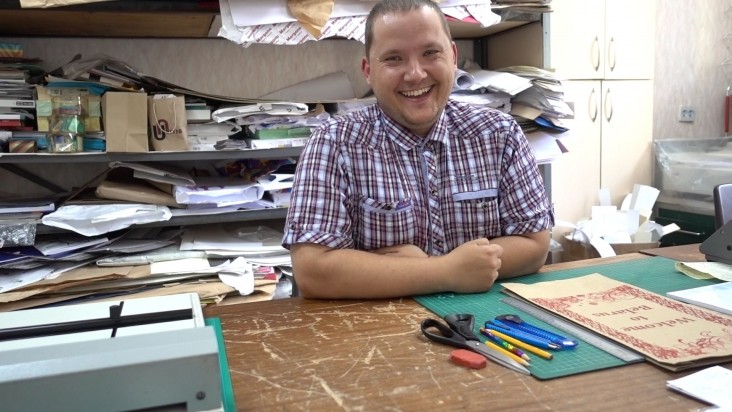Speeches Shim

As an infant, doctors diagnosed Pavel with cerebral palsy, which made it impossible for him to attend kindergarten. Instead, Pavel, who was born in Minsk, Belarus, in 1988, stayed at home where his mother and grandmother took care of him while his father worked as a metal worker to support the family. Like other children with disabilities, he completed a boarding school for children with special needs.
After graduation, Pavel wanted to find a job, but it proved extremely difficult. The Belarusian economy simply lacks enough jobs to accommodate people with disabilities (PWD). Moreover, the overall environment is still challenging to allow them to travel, work, and fully participate in social and economic life. Pavel was referred to the state social services only to discover that there were no options available for him. Pavel’s experience illustrates the difficulties that disabled people in Belarus constantly face, challenges that USAID is helping to alleviate.
After a painstaking yearlong wait, Pavel discovered an opportunity to work for a company producing medical supplies. He took the mandatory medical examination, coordinated with the potential employer, and arrived at the factory for his first day of work, only to have the employer turn Pavel down because his official medical documents did not allow him to work on the type of equipment used in the factory.
Frustrated, Pavel returned to his regular life of sitting at home and watching TV while continuing to pursue that rare employment opportunity. It was difficult to remain idle when he wanted to be independent and contribute to his family’s wellbeing.
Then one day, a friend told him about Art Idea – a social printing company created to train and employ PWD, which already employed 11 people like him. Enticed by Art Idea’s creative products, which include handicrafts including embroidery, gouache and acrylic painting, handmade gift cards and toys, wrapping paper, knitted napkins, and canvas pictures, Pavel applied for and obtained employment.
He quickly progressed from operating simple equipment to heading the printing department. He found new friends, developed an active social life and obtained stable income. Recently, he also graduated from Minsk State Electronics College with a certificate in computer operations.
“My life changed completely,” Pavel explains. “When I came here I was stiff and shy, I was even afraid to go out in the streets. Everyone seemed to stare at me – a man with a pair of crutches. But when I came here, I started to work, learned a lot, and blended into the team. And then step by step I began to feel that I belonged here. I changed. I became self-confident.”
Since 2014, USAID has partnered with the Belarusian Association of Assistance to Children and Young People with Disabilities (BelAPDIiMI) to implement the Art for Inclusion of People with Disabilities activity. The activity improves the quality of life of PWD by raising awareness, strengthening a network of local disabled people’s organizations (DPOs), and developing community based services.
USAID support promotes full scale inclusion of PWD by building the capacity of local organizations to better advocate for PWD rights, improving access to quality services, and sensitizing society on disability issues. More than 40 local DPOs and four social enterprises have already strengthened their organizational and professional capacities, introducing and piloting innovative services in rural areas of Belarus and helping more than 250 PWDs benefit. An awareness raising campaign that included social advertisements, art exhibitions, and theatrical performances reached more than 2.5 million people.
In a major breakthrough, Belarus ratified the UN Convention on the Rights of Persons with Disabilities in 2016, which came after many years of advocacy campaigns by DPOs. Currently, local DPOs work closely with the Government of Belarus to ensure effective implementation of the Convention.
BelAPDIiMI initiated 25 recommendations that were included in the National Plan on Implementing the UN Convention on the Rights of PWD for 2017-2025, 13 of which were already adopted.
Thanks to these support programs and businesses like Art Idea that emphasize inclusion, today people such as Pavel are able to make significant, meaningful contributions to their communities and society in general. Pavel’s experience at Art Idea brought him the self-confidence and job satisfaction he sought. Pavel’s story was infused with enormous challenges, but with some assistance and his strong determination, he has transformed his life tremendously.

Comment
Make a general inquiry or suggest an improvement.